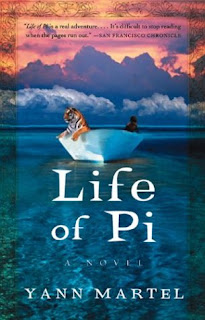I first heard about this book about three years ago. I was taking an open literature course where we were required to read seven books in a month and then meet one Friday night and Saturday and discuss the books. One of my classmates read this and gave one of the best book talks I had ever witnessed. I had also heard good things about it from my other friends. When I saw that it was being made into a movie, I figured it was a good time to read it.
This book was fascinating. While it wasn't a quick, can't-put-it down read, I was constantly drawn to it. It is remarkably well written, with a unique plot line and writing style that captures your attention without over-straining your emotions.
It is a story of Pi Patel, a young adult who become stranded at sea after the ship he and his family were aboard sinks in the middle of the Pacific Ocean. Pi's family was moving from India to Canada. They had previously run the Pondicherry Zoo, so their decision to move also resulted in them having to find new homes for all the animals, which resulted in the animals being aboard the ship with them. While all of the humans and most of the animals perished in the sinking of the ship, Pi survives along with a Royal Bengal Tiger, an orangutan, and a hyena. These four very unlikely shipmates all end up on a life boat together, stranded in the middle of the Pacific Ocean, trying to survive.
While I am not usually one to read survival stories and thoroughly enjoy them, I really liked this book. It was unique in the sense that not only did Pi have the elements and fate to contend with, he also had a Bengal Tiger (named Richard Parker, which is explained in the novel) to take care of. While most of us would think "Damn the tiger, my existence is of far greater importance", the fact that Pi did not do that is what makes this story so very unique. The humanity he shows this animal, first out of fear, then out of necessity, and eventually out of love, clearly demonstrates his inner character and is what helps to attach you to the main character and really want to know how his terrible plight ends up.
The way the author describes the highs and lows of Pi's struggle are fascinating. While in movies we see castaways and they are always focused on the horizon or fishing, an intrinsically motivated instinct, here in the book we get inside Pi's head and see what he notices, such as how beautiful the schools of fish around him are or how both beautiful and deadly the sunrise in the morning can be. The author's addition of these little details is what makes the book so good and keeps you reading.
Another aspect of this book I found particularly interesting was the inclusion of religions. Before the sinking of the ship and during his life in India, Pi Patel was a deeply religious individual. He was not only Hindu, but also Catholic and Muslim. If your head is spinning in confusion, it ought to be. These religions are all different, and under normal circumstances are irreconcilable. One cannot be all three at once; they contradict each other. But Pi's explanation is so simple and straight forward, I had to have some respect for him. His simple answer was "I want to love God". Such a simple answer breaks down the walls between religions and helps one remember what their true purposes are supposed to be. Then, throughout his struggle at sea, we see his faith as something he cannot let go of, even when his hope has begun to dim immensely. While I am not one to normally attach myself to the religious aspects of books and analyze them, I thought it was clever how this was added.
While I did say it was not a "can't put it down" read, I don't want there to be any confusion as to how interesting the book is. The book is fascinating, but not in an upheaval of emotion kind of way. I imagine the author wrote it in the style that he did to reflect the situation he was writing about. The book is interesting in the capturing of different details of the life of Pi as he is stranded at sea. Our attention is captured by all the little things that are noticed that we would not normally think about when we think castaway. This gives the book an interesting, yet relaxed feeling, as though we were on the boat with Pi, existing and noticing at the same time. We are interested, but we are not crazy mad with intrigue. We are appreciative. Then, when the strange instances occur, which there are a few, the writing style directly resembles that. The pace becomes quicker, the words more poignant, so that we get the same emotional feel as the character we are reading about. The writing style is quite fascinating in that sense. In the final scenes, when Pi is recounting his tale to the investigators who are treating him as though those 277 days lost at sea have fried his brain, we feel the same impatience and anger that Pi feels. This novel is truly written in an interesting way that draws the reader in and helps to mimic the emotions in the novel through its writing style.
Overall, I thoroughly enjoyed this book. It is not a difficult read, but it is not a quick read. It is a nice, relaxed read. I would recommend it to anyone. I plan on seeing the movie, but I will most likely be disappointed, let's be honest.
Check out the trailer here
